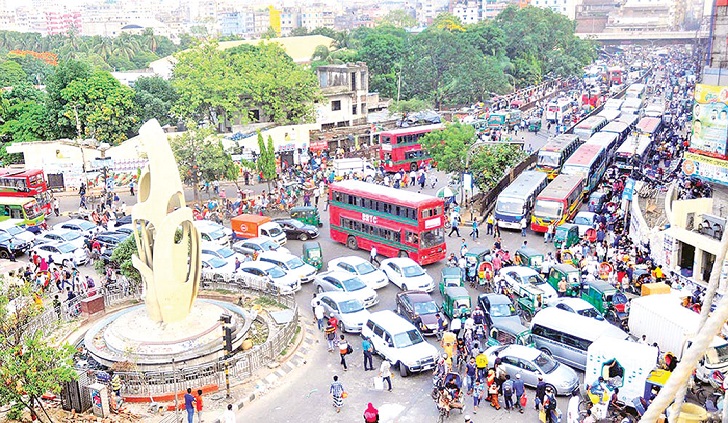
Administrative laws to ensure the right to a better city

Mobility plays a vital role in practicing the right to the city with the production of space which defines urbanity. People across Bangladesh are migrating to the core city for a better future and they are getting habituated to urban space. While using the space, they put effort to make the city more desirable through their earnings and developments which creates some basic rights to the city for them with mobility.
Therefore, the role administrative body begins here to create opportunity so that they can put more effort to take the country in a sustainable place. For that, the administrative bodies have to play a very vital role in ensuring equal opportunities, regulating and maintaining the existing laws to ensure the right to the city.
In relation to the mobility, space should properly be maintained by the administrations in both urban and rural area. In the rural area, the administrative role is played by the local government directly elected by the people. Hence, the people of rural areas have a very legitimate expectation towards the leaders since they got elected from the people.
However, in cities, there are different administrative bodies to deal with diverse issues as such WASH for water, DESCO for electricity and so many. Here, the administrative bodies are not elected, then the question may raise, do people of Dhaka city have any legitimate expectations towards the administrative bodies?
According to Lefebvre (1991), space (urban space) refers to the mode of production which consists of labour, land and capital of the persons who belongs to the hierarchical function. However, where there is a defined territory with a dense population, every people work very hard and invest their time and money that should not amount to wastage.
If the hierarchical people invest their money for labour, the lower class people make the production visible with their hard work. Hence, if we consider Dhaka city as a production of space, only the hierarchical people get prioritized over here and only their investments get advertised again and again. For example, if we count any garments accident, we find how much losses the owner suffered but no one is worried for those through whom garments or the factory run.
Even, labour laws do not provide enough compensatory provisions for the victims. If there were, then the victim of Tazreen garments factory or Rana Plaza would get a handsome amount of damages.
Lefebvre considers the Right to the City to be a political claim for demanding social justice which does not seek to eradicate poverty but to abolish the unjust inequality where he appealed to the highest of human value.
Notwithstanding anything contained in Lefebvre's reading, it is very difficult to value human life at the highest level.
In the spatial reading to the right to the city, Marcuse (2014) refers to the specific disciplines, professional, interests focused on the material built environment of the city. These groups of people would act upon what they are supposed to do to make the city a better place.
However, spatial reading did not talk about the right of the working-class people who also belong to the city where Lefebvre uses the city as a metaphor for a new way of life; here, he focused on the unjust inequality within the society.
Of course, we need equality but there is much more than equality to ensure the right to the city; that is equity. If equity can be confirmed, there would be no one to stand for their rights. For these discriminations, the working-class people may visit the higher official but they are unable to go out of fear; fear of being discriminated, fear of getting harassed, and fear of being humiliated Long ago, Bangladesh has established the Administrative Tribunal and Administrative Appellate Tribunal for the disputes relating to administrative issues. Moreover, Bangladesh has also enacted the Ombudsman Act, 1980, but ombudsman is yet to be appointed. However, people have last resort against it; that is Writ petition under Article 102 of the Constitution which is unknown by most of the people. To the contrary, the Officer in Charge of Goalondo Ghat made a difference to eliminate the distance between the public and Police Office.
The underprivileged are being neglected in that city where they come to make their dream true. They are not getting enough opportunity that they supposed to get and they are getting harassed as well. Where there is the law, the people need to be protected but here the scenario is the opposite. However, no laws can make anyone feel safe unless or until they are being enforced by the concerned authority.
It is the duty of the concerned citizens and the regulatory agencies to make the administration accountable by maintaining and enforcing the laws. The city emerged with a new thought of urbanity which occupies more space than a city usually occupied. Hence, urban space might abolish unjust inequality, promoting equity. Therefore, people have to be more enthusiastic to be part of the urban space for the development of urban space and to benefit their future.
S.M. Amanullahal Aman is a law graduate of BRAC University
Editor & Publisher: S. M. Mesbah Uddin
Published by the Editor from House-45,
Road-3, Section-12, Pallabi, Mirpur
Dhaka-1216, Bangladesh
Call: +01713180024 & 0167 538 3357
News & Commercial Office :
Phone: 096 9612 7234 & 096 1175 5298
e-mail: financialpostbd@gmail.com
HAC & Marketing (Advertisement)
Call: 01616 521 297
e-mail: tdfpad@gmail.com